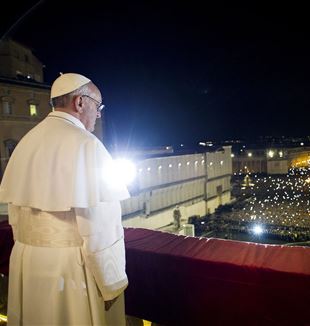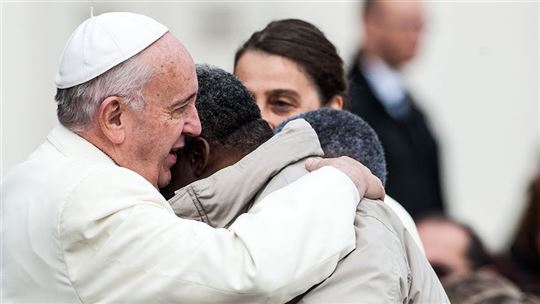
Francis’ 99 sheep
"I am a sinner whom the Lord has looked upon." This is how Bergoglio, elected Pope on March 13, 2013, described himself. Ten years of Pontificate proclaiming the joy of the Gospel to the world. From the March issue of Tracce.The moment Cardinal Tauran spelled out the baptismal name of the new Pope in Latin, we understood that he was the chosen one: Georgium Marium, yes, unbelievable, him, Jorge Mario...Cardinal Bergoglio. I was live with my news program on the drizzly evening of March 13, 2013, and I remember my great excitement because I had had the good fortune to meet that Argentine Cardinal, unknown to most, and considered him a true man of God. For about eight years I had seen him every time he came to Rome, we had dinner at Gianni Valente and Stefania Falasca's house, we went to the Basilica of San Lorenzo where he celebrated Mass with Fr. Giacomo Tantardini. We began exchanging our impressions on the life of the Church by email, and I once asked him for confession. Pope Francis is first and foremost known as a priest and a missionary. As a young Jesuit he wanted to leave for Japan, but for health reasons his superiors denied him a visa to the Land of the Rising Sun. Nevertheless, Bergoglio discovered that in our time, the first place of mission is the West. The peripheries of former Christendom, the new unknown lands, no longer encompassed the impenetrable Iguazú Falls, the Guarani of Paraguay, or the distant Indies where Francis Xavier's disciples pressed on, but now encompassed the great metropolises, even in South America, where the villas miseria rose in the shadow of the skyscrapers, the cities of misery where "the sun of the good God" did not seem to emit its rays. Not only sociological peripheries, existential peripheries where modern man is no longer able to believe in God, but not out of malice, but because for too long perhaps he has not encountered Christians with the face of saved people, as Nietzsche put it. "He returned to the sheepfold and realized that one sheep was missing,” Francis smiled during his first meeting with his diocese on June 17, 2013. "Brothers and sisters, we have one sheep. We have lost the other 99! We must go out, we must go out to them!"
It is this missionary gaze that is the key to reading all of Francis’ gestures in the last ten years. For how is it possible to get in touch with modern man, to assist him with his wounds, if not with the medicine of mercy? Certainly not with a barrage of anathemas or obtuse "proselytism," but with the "attractive" force of a witness. Francis was aware from the beginning that his missionary approach would cause misunderstandings. This was nothing new. It had already happened to Jesuit Matteo Ricci, the great missionary in China who adopted their dress and tolerated ancestor worship to win souls to Christ. Rome did not understand and the Church in China still pays for certain mistakes. That distant China that, not surprisingly, is in the heart of the first Jesuit pope. After seventy years in which Beijing appointed bishops on its own account, causing painful divisions within the Catholic community, the Holy See now has now gone back – thanks to an Agreement signed in 2018 – to having a say in the choice of its pastors, and no Chinese bishop is separated from Rome anymore. It sometimes involves bitter compromises, difficult dialogues, but is still a step forward from the years of the most violent persecution. Besides, better a "Church that gets into accidents," Bergoglio often says, than a still, sick Church because stagnant air is not good for the body or the spirit.
Evangelii gaudium, the joy of the Gospel: the title of the apostolic exhortation that remains the magna carta of his pontificate. Paul VI's Evangelii nuntiandi: the papal document by far the most quoted by Francis. Attention to the poor, the sick, the discarded is not communism or humanitarian do-goodism, as some vulgar propaganda has trumpeted: it is bearing witness to Christ's compassion for every man. It lies at the root of his every commitment. The struggle for peace in the world, from Syria to Iraq, from Yemen to the Holy Land, from the Congo to the most distressing and "diabolical" of all wars today, in the "tormented" Ukraine. And then the care for the common home: the integral ecology of which Benedict XVI had already spoken and which Francis relaunched with Laudato si', an occasion of encounter with secular movements and personalities – such as the great Carlin Petrini –, who in the Catholic Church have found an ideal reference point in the commitment to save the planet from self-destruction. Dialogue with Islam, to foster, in a spirit of fraternity, a non-fundamentalist evolution of Muhammad's religion and to protect Christian minorities, which are in extraordinary growth in the Muslim countries of the Gulf thanks to the phenomenon of immigration (which instead frightens us). How exciting were those first Masses celebrated by a Pope in Arabia, where it seemed impossible until a few decades ago to see a successor of Peter surrounded by a crowd of Christians, tens of thousands of faithful, Filipino or Indian workers, who could not believe their eyes from joy. The Francis I met is first and foremost a priest.
There is so much prayer hidden in his daily life. A traditional form of prayer, made up of rosaries and Marian piety, Eucharistic adoration, novenas, like the one, so dear to him, to St. Therese of Lisieux. And there is much closeness to situations of sorrow. One of the most controversial issues of his pontificate has been the pastoral accompaniment of remarried divorcees and their possible access to the sacraments, to be evaluated on a case-by-case basis. Some traditionalists have been tearing their hair out thinking they have finally found proof of his heresy. They failed to understand that what moved Bergoglio was the solicitude of the priest and confessor toward the suffering of torn souls, not the desire to break Catholic doctrine on marriage. On the other front, let's call it "old-progressive,” theologians and enlightened professors deluded themselves into believing that they could dictate their own agenda on the abolition of priests' celibacy and women's priestly ordination to the pope. When Francis very clearly made it clear that he intended to confirm the teaching of his revered predecessors, they began to turn up their noses, treating Francis like an undisciplined schoolboy who refuses to learn his lesson.
Read also - Someone with me
But he does not lose sleep over it. "I sleep like a log," he confided in an interview granted to Tv2000 on the occasion of the Jubilee of Mercy in 2016. One can sleep like that only when one surrenders oneself into God's hands. In the same interview, he said that in any case he preferred objectors to flatterers because criticism (even the wrong kind) still reminds him of his many limitations and sins. And this awareness is good for the soul: "The first condition to be healed is the consciousness of being sick." Antonio Spadaro in the summer of 2013 asked the new Pope, "Who is Jorge Mario Bergoglio?" Francis thought about it for a moment and then with great sincerity answered that perhaps he could say that he felt "a bit astute," someone who knows how to move ... but at the same time he also realized that he was "a little bit naive." Astute and naïve at the same time; humanly speaking, that can be the case. However, with equal sincerity the new Pope added an even truer definition of himself: "I am a sinner. This is the most accurate definition. It is not a figure of speech, a literary genre I am a sinner […] But the best summary, the one that comes more from the inside and I feel most true is this: I am a sinner whom the Lord has looked upon. I am one who is looked upon by the Lord. I always felt my motto, Miserando atque Eligendo, was very true for me." And looking at him with mercy he called him: an episcopal motto inspired by the Gospel of the calling of Matthew the tax collector, the Gospel passage Francis loves most because the man was not a beautiful soul, he was a collaborator with the hated Romans, more attached to money than to his own mother. He seemed unsalvageable. Yet, Jesus mercied him and Matthew's whole life was revolutionized by that gaze. This is what happened to the young student Bergoglio on September 21, 1953, the first day of spring in the southern hemisphere, in the parish dedicated to St. Joseph in Buenos Aires: confession with a priest he did not know, the experience of mercy as he had never experienced it. "Because God is looking for you and waiting for you before you start looking for him, he comes first, primerea as says the popular expression from Buenos Aires."
Before entering the conclave, in March 2013, before the Cardinals gathered to choose the new Pope, he spoke of the Mysterium Lunae, an expression dear to the Church Fathers. He said that the Church, like the moon, does not shine with its own light, but is in the world only to reflect the light of Christ. Ten years later, Francis, with fear and trembling, but with a serene heart, may ask himself whether he too, a sinner looked upon by the Lord, by God's grace has reflected some of that light into the world. For deep peace and the only judgement that counts, in God’s eyes, lies in this transparency of Christ, not in worldly successes or failures.